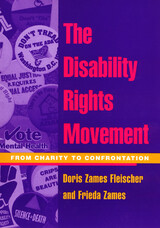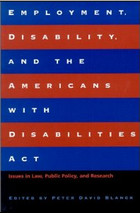5 books about Handicapped

Disability Protests
Contentious Politics, 1970 - 1999
Sharon N. Barnartt
Gallaudet University Press, 2001
Part and parcel to the civil rights movements of the past thirty years has been a sustained, coordinated effort among disabled Americans to secure equal rights and equal access to that of non-disabled people. Beyond merely providing a history of this movement, Sharon Barnartt and Richard Scotch's Disability Protests: Contentious Politics, 1970-1999 offers an incisive, sociological analysis of thirty years of protests, organization, and legislative victories within the deaf and disabled populations.
The authors begin with a thoughtful consideration of what constitutes "contentious" politics and what distinguishes a sustained social movement from isolated acts of protest. The numbers of disability rights protests are meticulously catalogued over the course of thirty years, revealing significant increases in both cross-disability actions as well as disability-specific actions. Political rancor within disability communities is addressed as well. Chapter four, "A Profile of Contentious Actions" confronts the thorny question of who is "deaf enough" or "disabled enough" to adequately represent their constituencies.
Barnartt and Scotch conclude by giving special attention to the Rehabilitation Act of 1973, the Americans with Disabilities Act of 1990, and the 1988 Deaf President Now protest, focusing on how these landmark events affected their proponents. Disability Protests offers an entirely original sociological perspective on the emerging movement for deaf and disability rights.
Sharon Barnartt is Professor of Sociology at Gallaudet University.
Richard Scotch is Associate Professor of Sociology and Political Economy at the University of Texas at Dallas.
[more]

Disability Rights Movement
From Charity to Confrontation
Doris Fleischer
Temple University Press, 2000
Based on interviews with almost a hundred activists, this book provides a detailed history of the struggle for disability rights in the United States. It is a complex story of shifts in consciousness and shifts in policy, of changing focuses on particular disabilities such as blindness, deafness, polio, quadriplegia, psychiatric and developmental disabilities, chronic conditions (for example, cancer and heart disease), and AIDS, and of activism and policymaking across disabilities.
Referring to the Americans with Disabilities Act as "every American's insurance policy," the authors recount the genesis of this civil rights approach to disability, from the almost forgotten disability activism of the 1930s to the independent living movement of the 1970s to the call for disability pride of the 1990s. Like other civil rights struggles, the disability rights movement took place in the streets and in the courts as activists fought for change in the schools, the workplace, and in the legal system. They continue to fight for effective access to the necessities of everyday life -- to telephones, buses, planes, public buildings, restaurants, and toilets.
The history of disability rights mirrors the history of the country. Both World Wars sparked changes in disability policy and changes in medical technology as veterans without without limbs and with other disabilities return home. The empowerment of people with disabilities has become another chapter in the struggles over identity politics that began in the 1960s. Today, with the expanding ability of people with disabilities to enter the workforce, and a growing elderly population increasingly significant at a time when HMOs are trying to contain healthcare expenditures.
Referring to the Americans with Disabilities Act as "every American's insurance policy," the authors recount the genesis of this civil rights approach to disability, from the almost forgotten disability activism of the 1930s to the independent living movement of the 1970s to the call for disability pride of the 1990s. Like other civil rights struggles, the disability rights movement took place in the streets and in the courts as activists fought for change in the schools, the workplace, and in the legal system. They continue to fight for effective access to the necessities of everyday life -- to telephones, buses, planes, public buildings, restaurants, and toilets.
The history of disability rights mirrors the history of the country. Both World Wars sparked changes in disability policy and changes in medical technology as veterans without without limbs and with other disabilities return home. The empowerment of people with disabilities has become another chapter in the struggles over identity politics that began in the 1960s. Today, with the expanding ability of people with disabilities to enter the workforce, and a growing elderly population increasingly significant at a time when HMOs are trying to contain healthcare expenditures.
[more]

The Disabled in the Soviet Union
Past and Present, Theory and Practice
William O. McCagg
University of Pittsburgh Press, 1989
In topics ranging from industrial accident prevention before and during Stalin's industrialization drive to the long and complex history of the Soviet “science” called defectology, the essays in this collection chronicle the responses of the state and society to a variety of disabled groups and disabilities. Also included, in addition to the editors, are Julie Brown, Vera Dunham, David Joravsky, Janet Knox and Alex Kozulin, Stephen and Ethel Dunn, Bernice Madison, Paul Raymond, and Mark Field.
This unusual and provocative collection brings to light a dimension of Soviet history and policy rarely explored.
This unusual and provocative collection brings to light a dimension of Soviet history and policy rarely explored.
[more]

Employment, Disability, and the Americans with Disabilities Act
Issues in Law, Public Policy, and Research
Peter David Blanck
Northwestern University Press, 2000
The Americans with Disabilities Act of 1990 (ADA) was heralded by its congressional sponsors as an "emancipation proclamation" for people with disabilities and as the most important civil rights legislation passed in a generation. Employment, Disability, and the Americans with Disabilities Act offers a meticulously documented assessment of what has occurred since the ADA's enactment. In reasoned, empirically based articles, contributors from law, health policy, government, and business reveal the unsoundness of charges from the right that the ADA will bankrupt industry and assumptions on the left that the ADA will prove ineffective in helping those with disabilities enter and remain in the workforce.
[more]

From good will to civil rights
transforming federal disability policy
Richard K. Scotch
Temple University Press, 1984
"An excellent case study of the enactment and implementation of Section 504...this book will interest students of the American public policy-making processes as well as those with a special interest in civil rights and disability policy."
--Choice
Now that curb cuts, braille elevator buttons, and closed caption television are commonplace, many people assume that disabled people are now full participants in American society. This book tells a rather different story. It tells how America's disabled mobilized to effect sweeping changes in public policy, not once but twice, and it suggests that the struggle is not yet over.
The first edition of From Good Will to Civil Rights traced the changes in federal disability policy, focusing on the development and implementation of Section 504 of the Rehabilitation Act of 1973. Richard K. Scotch's extensive interviews with policymakers, leaders of the disability rights movement, and other advocates, supplemented the sketchy official history of the legislation with the detailed, behind-the-scenes story, illuminating the role of the disability rights movement in shaping Section 504. Charting the shifts in policy and activist agendas through the 1990s, this new edition surveys the effects and disappointments associated with the Americans with Disabilities Act, passed in 1990, in the context of the continuing movement to secure full civil rights for disabled people.
"This analysis...is almost certain to become a classic work in the literature that will eventually emerge in this field."
--Harlan Hahn, Contemporary Sociology
"The best thing about Scotch's book is that it shows why, despite the broad rights language of the legislation and its regulations, Section 504 exists in a vacuum, with this country still, for the most part, unconcerned about disability rights.... Advocates should read Scotch's book... It's a good place to start on the future."
--The Disability Rag
[more]
READERS
Browse our collection.
PUBLISHERS
See BiblioVault's publisher services.
STUDENT SERVICES
Files for college accessibility offices.
UChicago Accessibility Resources
home | accessibility | search | about | contact us
BiblioVault ® 2001 - 2024
The University of Chicago Press









